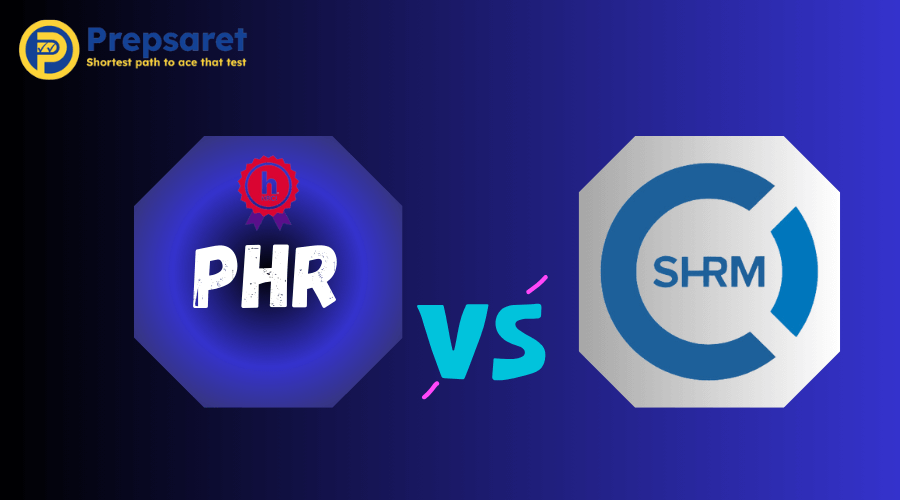When it comes to advancing your career in human resources (HR), two of the most recognized certifications are the Professional in Human Resources (PHR) and the Society for Human Resource Management Certified Professional (SHRM-CP). Understanding PHR vs. SHRM can help you choose the right certification for your HR career—learn the differences and start preparing with practice
Both certifications are highly regarded in the industry, but they differ significantly in terms of the certifying body, eligibility requirements, exam content, and their focus on specific aspects of HR. Understanding these differences is key to determining which certification aligns best with your career goals.
What Is PHR Certification?
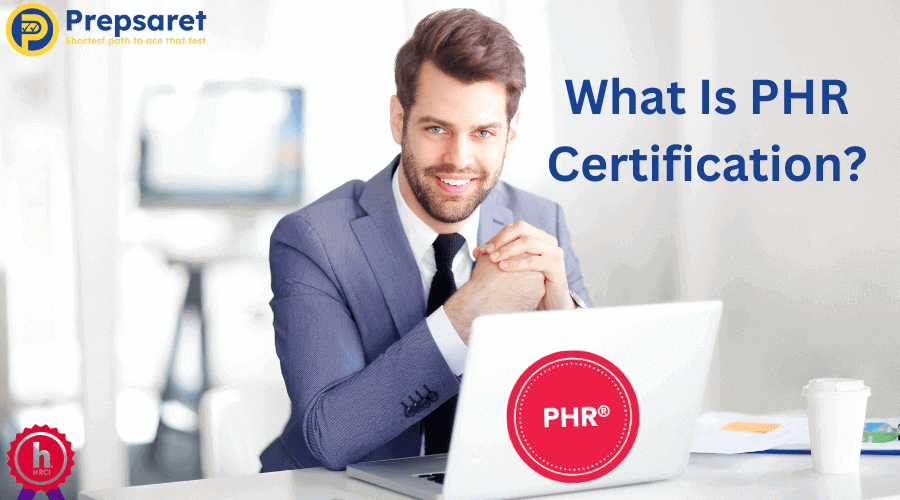
The Professional in Human Resources (PHR) certification is designed for HR professionals who have a strong foundational knowledge of HR principles and practices.
Administered by the HR Certification Institute (HRCI), the PHR certification is aimed at individuals who are responsible for HR functions in a professional setting, such as implementing policies, managing recruitment, employee relations, and ensuring compliance with federal and state laws.
The purpose of the PHR certification is to validate the skills and knowledge of HR professionals in tactical and operational roles. It’s ideal for individuals in HR roles who have a few years of experience in managing HR functions and who wish to demonstrate their competency and enhance their credibility in the HR field.
Earning the PHR certification can lead to numerous career benefits, including:
- Enhanced Credibility: The PHR credential signals to employers that you possess a comprehensive understanding of HR practices and principles. Certified HR professionals are often considered more knowledgeable, well-versed in industry standards, and capable of addressing complex HR challenges effectively. According to the HR Certification Institute, those with the PHR certification are more likely to be viewed as experts within their organization and can often negotiate higher salaries or more senior roles in the future.
- Career Advancement: Many organizations prefer or require certification for HR positions, making it easier to advance into higher-level roles. PHR-certified professionals often have more job security as their certification assures employers that they have up-to-date knowledge on labor laws, compensation practices, employee relations, and more. This certification is a recognized standard in the HR industry and provides the holder with a competitive edge when applying for HR roles.
- Increased Earning Potential: According to PayScale, PHR-certified professionals earn an average salary of approximately $70,000 per year, compared to non-certified peers.
Read also: SPHR certification
What Is SHRM Certification?
The Society for Human Resource Management (SHRM) offers two certification tracks: SHRM Certified Professional (SHRM-CP) and SHRM Senior Certified Professional (SHRM-SCP).
These certifications focus on both the knowledge and behavioral competencies required to excel in the HR profession. Unlike the PHR, which is offered by HRCI, SHRM HR certifications are awarded by the Society for Human Resource Management, a leading global association for HR professionals.
These certifications focus on both operational and strategic aspects of human resources.
- The SHRM-CP is designed for early-career HR professionals and those who have significant HR responsibilities but may not yet hold a senior leadership position. It focuses on foundational HR competencies, knowledge, and application.
- The SHRM-SCP is aimed at more seasoned professionals who work in strategic HR roles and are responsible for leading HR functions within their organizations.
The SHRM certifications place a strong emphasis on behavioral competencies such as relationship management, consultation, global & cultural effectiveness, and leadership & navigation. These competencies are essential for HR professionals who are tasked with driving change and aligning HR strategies with organizational goals.
Value of SHRM Certifications
The value of SHRM certifications lies in their comprehensive approach, combining both knowledge and soft skills to ensure that HR professionals are not only knowledgeable about HR processes but also capable of applying that knowledge in real-world situations.
SHRM-certified professionals are seen as leaders in the HR field who possess both technical HR expertise and the ability to drive organizational change, making them highly valued by employers.
What’s the Difference Between PHR and SHRM Certification?
Understanding the differences between PHR and SHRM certifications can help you choose the right path for your career.
Who Offers It?
The certifying organizations differ between the two credentials:
- The PHR certification is offered by the HR Certification Institute (HRCI), a nonprofit organization that specializes in certifying HR professionals. HRCI is known for its rigorous standards and its long-standing reputation for certifying HR professionals globally.
- The SHRM certification is offered by the Society for Human Resource Management, the world’s largest HR professional association. SHRM is highly regarded for its focus on both HR technical knowledge and behavioral competencies, making it a popular choice for HR professionals seeking to develop leadership capabilities.
Both organizations are reputable within the industry but have different focuses in their training and certification processes.
Eligibility and Qualification Requirements
There are distinct eligibility requirements for both the PHR and SHRM certifications, which help to define who is eligible to take each exam.
PHR Eligibility Requirements
To qualify for the PHR exam, candidates must meet specific educational and professional experience criteria:
- A master’s degree or higher plus at least one year of professional-level HR experience.
- A bachelor’s degree plus at least two years of professional-level HR experience.
- If a candidate does not meet the educational requirement, they must have four years of experience in a professional HR role instead.
This structure ensures that candidates have a solid foundation before attempting the exam.
SHRM-CP Eligibility Requirements
For SHRM-CP certification requirements require that candidates must also meet certain criteria:
- A master’s degree or higher plus at least one year of experience in an HR role.
- A bachelor’s degree plus at least one year of experience in an HR role.
- An associate’s degree or high school diploma plus three years of experience in an HR role.
These requirements emphasize practical experience alongside educational qualifications.
Exam Format
Both the PHR and SHRM certifications require candidates to pass an exam, but the format of these exams differs significantly. The PHR exam consists of 115 multiple-choice questions that cover a wide range of HR topics, such as business management, talent acquisition, and HR operations. The test duration is approximately three hours.
The SHRM-CP exam, in contrast, consists of 160 questions, including both multiple-choice and situational judgment questions. The exam duration is also around three hours, but it places greater emphasis on real-world scenarios and tests the ability to apply HR knowledge in practice. This makes the SHRM-CP exam more focused on strategic thinking and decision-making, in addition to foundational HR knowledge.
Exam Composition
The content of both exams differs based on their respective focuses.
PHR Test Content
The PHR exam focuses on tactical HR operations:
- talent acquisition
- employee relations,
- compensation & benefits
- HR operations,
- business management,
- and risk management.
These topics are more aligned with the day-to-day operational tasks an HR professional is likely to encounter.
SHRM-CP Test Content
The SHRM-CP exam covers both:
- HR knowledge
- Behavioral competencies.
The knowledge portion includes areas such as HR strategy, employee development, and compensation & benefits. The behavioral competencies section assesses skills like relationship management, global & cultural effectiveness, and leadership. This broader focus makes the SHRM-CP exam a better fit for those in or aspiring to leadership roles in HR.
Test Dates
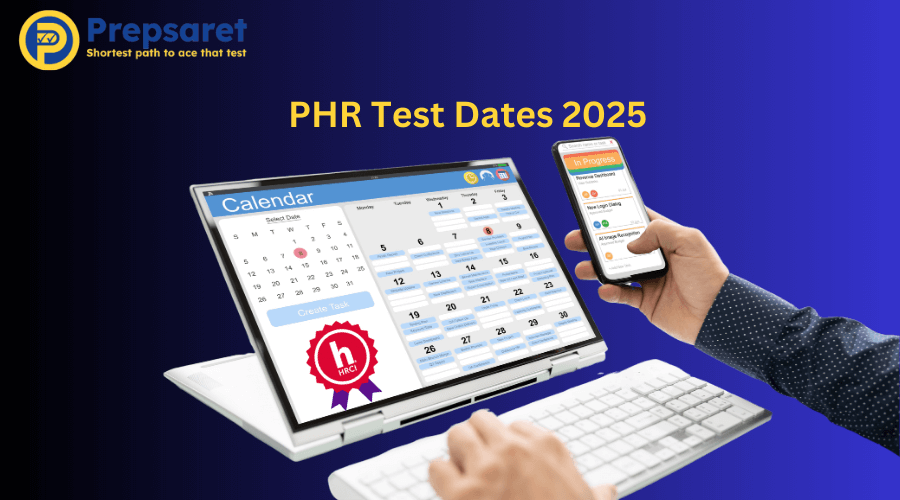
Both the PHR and SHRM exams are offered multiple times throughout the year, allowing candidates to choose a date that fits their schedule. However, candidates must register in advance and may be subject to deadlines for registration.
Renewal
Both certifications require periodic renewal. PHR certification holders must recertify every three years by earning 60 recertification credits or retaking the exam. Similarly, SHRM-CP certification holders must also recertify every three years, either by earning 60 professional development credits or retaking the exam. The renewal process ensures that HR professionals stay current with evolving HR practices and policies.
PHR vs SHRM Costs
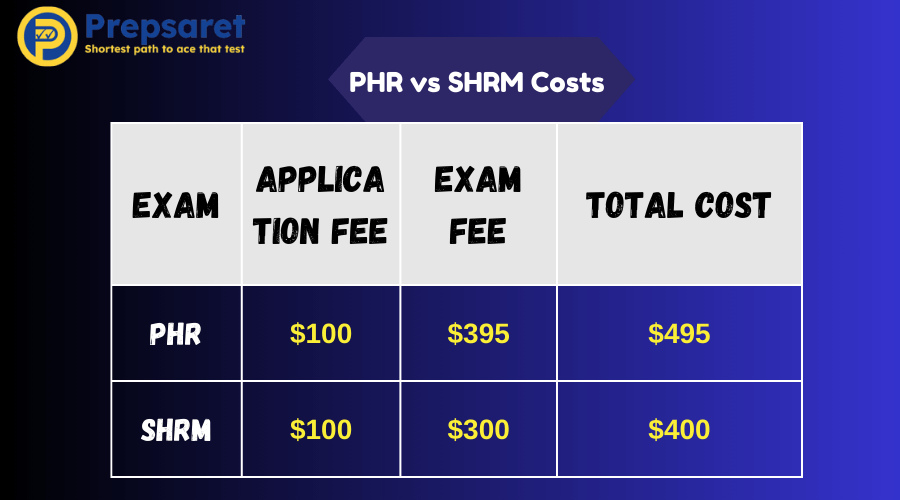
When considering professional certifications in human resources, the costs associated with obtaining the PHR (Professional in Human Resources) and SHRM (Society for Human Resource Management) certifications can significantly influence your decision.
PHR Certification Costs
The PHR certification is administered by the HR Certification Institute (HRCI). Here’s a breakdown of the costs associated with obtaining this certification:
- Exam Fees: The PHR exam has a registration fee of $395 along with a non-refundable application fee of $100. This brings the total cost to $495.
- Study Materials: While there are free resources available, many candidates opt for official study guides and practice exams to enhance their preparation. These materials can range from $50 to $200, depending on the provider.
- Renewal Costs: The PHR certification must be renewed every three years. To maintain your certification, you need to earn 45 continuing education credits (CEUs). The renewal fee is approximately $169, which covers one certification; additional certifications incur extra fees.
SHRM Certification Fees
The SHRM certification costs are as follows:
- Exam Fees: For SHRM members, the SHRM-CP exam fee is typically around $335, while non-members pay about $435. The SHRM-SCP exam costs $495 for members and $595 for non-members.
- Study Materials: The SHRM Learning System is a popular resource that provides comprehensive study materials and practice questions. This system can cost between $400 and $900, depending on whether you are a member or non-member.
- Renewal Costs: Similar to PHR, SHRM certifications require renewal every three years. Candidates must earn 60 professional development credits (PDCs) during this period. The renewal fee for SHRM members is approximately $100, while non-members pay around $150.
What’s the Difference Between the PHR and SHRM-CP?
Understanding the differences between PHR and SHRM-CP certifications can help HR professionals choose the right path for their careers.
- Focus Areas: The PHR certification focuses more on operational HR functions, whereas the SHRM-CP emphasizes both operational and strategic HR competencies.
- Career Outcomes: PHR is often seen as more suitable for mid-level HR professionals, while SHRM-CP prepares candidates for roles that require a broader understanding of HR strategy and leadership.
What Is the Pass Rate for PHR vs. SHRM?
According to recent statistics, the pass rate for the PHR exam is approximately 61%, indicating that many candidates successfully achieve this certification on their first attempt. The passing score for the PHR exam is set at 500 on a scaled scoring system that ranges from 100 to 700.
This means candidates need to demonstrate a solid understanding of HR principles to pass.
In contrast, the pass rate for the SHRM-CP exam is around 71%, suggesting that candidates may find this certification slightly easier to pass relative to the PHR. The passing score for the SHRM-CP is also not explicitly stated but is generally understood to be around 200 on a similar scaled scoring system.
Which Exam Is More Difficult?
Determining which exam is more difficult depends on several factors, including content complexity and candidate preparation:
- The PHR exam consists primarily of multiple-choice questions focused on HR operations, compliance, and employee relations. Some candidates may find this straightforward due to its practical nature.
- The SHRM-CP exam includes multiple-choice questions as well as scenario-based items that assess behavioral competencies. This format requires not only knowledge but also critical thinking skills, which some candidates may find challenging.
Feedback from candidates suggests that those who excel in strategic thinking may find the SHRM-CP exam more manageable, while those with strong operational knowledge may prefer the PHR exam.
Preparing for PHR vs SHRM Exam
Preparation strategies play a crucial role in successfully passing either certification exam. Here are some effective methods:
1. Flashcards
Using flashcards can be an effective way to quickly revise key HR concepts. Whether you are preparing for the PHR or SHRM-CP, flashcards can help you memorize important terms, definitions, and HR principles. They are especially useful for reinforcing knowledge of policies, regulations, and HR terminology that frequently appear on both exams.
2. Use Official Study Guides
Leveraging official study guides is essential for aligning your study efforts with the exam outline. These guides provide structured content that covers all necessary topics comprehensively. These guides are specifically designed to align with the exam outline. They are often available in print and digital formats and provide a structured approach to studying.
3. PHR Practice Exams
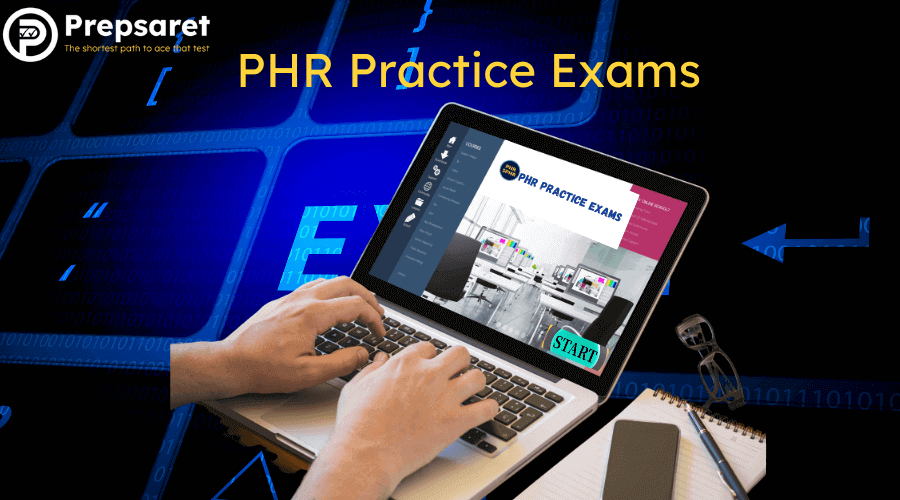
Taking practice exams specifically designed for the PHR can help identify knowledge gaps while boosting confidence in your understanding of HR concepts. PHR practice exams also help you identify areas of weakness, familiarize yourself with the question format, and gain confidence.
Prepsaret offers high-quality PHR practice exams with detailed explanations for both correct and incorrect answers, making it easier to understand where you need improvement.
4. SHRM Practice Exams
SHRM-CP practice exams and SHRM-SCP practice exams are similarly essential. They allow you to familiarize yourself with the exam pattern and provide an opportunity to test your application of HR knowledge in real-world scenarios.
Prepsaret also provides high-quality practice exams tailored for both SHRM certifications that simulate the actual exam experience and improve your ability to manage time effectively during the test.
5. SHRM Learning System
The SHRM Learning System is a comprehensive resource for SHRM-CP and SHRM-SCP exam preparation. It provides a combination of online tools, and study materials that cover all aspects of the SHRM certification exams. The Learning System is designed to ensure that candidates are fully prepared and confident going into the exam.
Why You Should Use Prepsaret to Prepare for Your PHR and SHRM Exams
When it comes to preparing for the PHR (Professional in Human Resources), SHRM-CP (Certified Professional), and SHRM-SCP (Senior Certified Professional) exams, using high-quality resources is crucial for success.
Prepsaret offers a comprehensive suite of practice exams, lessons, quizzes, and other resources designed to help candidates excel in their certification journey.
PHR Practice Exams
Prepsaret provides over 250 PHR practice questions that mimic the actual exam environment. These practice tests are essential for candidates looking to assess their knowledge and readiness.
- Detailed Explanations: Each question comes with a thorough explanation of the correct and incorrect answers, enabling candidates to understand the reasoning behind each response. This feature helps reinforce learning and clarifies complex HR concepts.
- Realistic Testing Experience: By simulating the actual exam format, these practice exams help candidates become familiar with the types of questions they will encounter, reducing anxiety on test day.
Prepsaret also offers comprehensive lessons specifically tailored for the PHR exam. These lessons provide a structured approach to studying, ensuring that candidates grasp all necessary concepts before taking the exam.
SHRM-CP Practice Exams
For those preparing for the SHRM-CP certification, Prepsaret offers over 500 high-quality practice questions tailored specifically for this credential.
- Comprehensive Coverage: The SHRM-CP practice exams cover all core topics outlined in the exam blueprint, ensuring that candidates are well-prepared across all necessary areas.
- Performance Tracking: Candidates can track their performance over time, identifying strengths and weaknesses to focus their study efforts effectively.
Prepsaret provides extensive lessons designed for SHRM-CP candidates, focusing on key areas. These lessons equip candidates with the knowledge needed to excel in both operational and strategic HR roles.
SHRM-SCP Practice Exams
Similar to the SHRM-CP offerings, Prepsaret also provides over 500 specialized practice questions for the SHRM-SCP certification.
- Advanced Content Focus: These practice exams delve into more strategic HR topics relevant to senior professionals, helping candidates prepare for higher-level responsibilities.
- Feedback Mechanism: Just like with other practice tests, candidates receive detailed feedback on their performance, which is invaluable for improving understanding and retention of advanced HR concepts.
Prepsaret’s SHRM-SCP lessons focus on advanced HR management topics. These comprehensive lessons prepare candidates for the complexities of senior HR roles.
Tips for Choosing Between PHR and SHRM Certification
Deciding between PHR and SHRM certifications can be challenging. Here are some tips to help you make an informed choice:
1. Consider the Content
Evaluate the topics and focus areas of each certification. The PHR certification emphasizes operational HR functions such as compliance and employee relations, while the SHRM-CP includes both operational and strategic competencies. Understanding these differences will help you align your choice with your career goals.
2. Determine Your Level of Expertise
Match your career goals and professional experience with the right certification. If you are early in your HR career or focused on operational roles, PHR may be more suitable. Conversely, if you have more experience or aspire to strategic HR leadership positions, pursuing the SHRM-CP might be a better fit.
FAQs
Which HR Certification Is Best?
The best HR certification depends on your career goals and current expertise. If you are looking for foundational knowledge in HR operations, PHR may be ideal. However, if you aim for strategic roles or leadership positions in HR, pursuing a SHRM certification could provide greater value.
Which Is Better, SHRM or HRCI?
Determining whether SHRM or HRCI is better depends on individual career aspirations. SHRM certifications often emphasize behavioral competencies alongside technical knowledge, making them suitable for those seeking leadership roles.
HRCI certifications like PHR focus more on operational aspects of HR. Consider your career path when choosing between them.
What Does PHR Mean?
PHR stands for Professional in Human Resources. It is a certification offered by the HR Certification Institute (HRCI) that validates an individual's knowledge and skills in various HR functions such as recruitment, employee relations, compliance, and performance management.
Get Started with Your Certification Journey Today!
Choosing the right certification is crucial for advancing your career in human resources. Whether you opt for PHR or one of the SHRM certifications, effective preparation is key to success.
Prepsaret offers valuable resources that can enhance your study experience and improve your chances of passing your exams on the first attempt.
With comprehensive practice exams, detailed explanations, and a wealth of study materials at your disposal, you can approach your certification journey with confidence. Start exploring Prepsaret’s offerings today—your path to certification success begins here!

